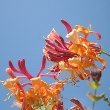Honeysuckle (Lonicera spp.)
Honeysuckle (Lonicera spp.)
Natural Standard Bottom Line Monograph, Copyright © 2013 (www.naturalstandard.com). Commercial distribution prohibited. This monograph is intended for informational purposes only, and should not be interpreted as specific medical advice. You should consult with a qualified healthcare provider before making decisions about therapies and/or health conditions.
While some complementary and alternative techniques have been studied scientifically, high-quality data regarding safety, effectiveness, and mechanism of action are limited or controversial for most therapies. Whenever possible, it is recommended that practitioners be licensed by a recognized professional organization that adheres to clearly published standards. In addition, before starting a new technique or engaging a practitioner, it is recommended that patients speak with their primary healthcare provider(s). Potential benefits, risks (including financial costs), and alternatives should be carefully considered. The below monograph is designed to provide historical background and an overview of clinically-oriented research, and neither advocates for or against the use of a particular therapy.
Related Terms
Caprifoliaceae (family), Chinese honeysuckle, coral honeysuckle, eglantine, European honeysuckle, Hall's Japanese honeysuckle, Japanese honeysuckle, Lonicera caerulea, Lonicera japonica, Lonicera japonica holliana, Lonicera periclymenum, Lonicera sempervirens, Lonicera spp., trumpet honeysuckle, white honeysuckle, woodbine honeysuckle, woodbine.
Background
There are at least 180 species of honeysuckle, with most species found in Asia and a few in Europe and the Americas.
In homeopathy, honeysuckle has been used for asthma, breathing difficulties, irritability with violent outbursts, and syphilis. However, currently there is no clinical evidence available supporting the use of honeysuckle for these conditions or any other indication.
Honeysuckle poisoning from ingestion by children may cause severe gastrointestinal symptoms and cramping.
Scientific Evidence
Uses These uses have been tested in humans or animals. Safety and effectiveness have not always been proven. Some of these conditions are potentially serious, and should be evaluated by a qualified healthcare provider. |
Grade* |
No available studies qualify for inclusion in the evidence table. |
|
*Key to grades:A: Strong scientific evidence for this use; B: Good scientific evidence for this use; C: Unclear scientific evidence for this use; D: Fair scientific evidence against this use (it may not work); F: Strong scientific evidence against this use (it likely does not work). |
|
Tradition/Theory
The below uses are based on tradition or scientific theories. They often have not been thoroughly tested in humans, and safety and effectiveness have not always been proven. Some of these conditions are potentially serious and should be evaluated by a qualified health care professional.
Asthma, breathing difficulties, irritability (with violent outbursts), syphilis (STD).
Dosing
The below doses are based on scientific research, publications, traditional use, or expert opinion. Many herbs and supplements have not been thoroughly tested, and safety and effectiveness may not be proven. Brands may be made differently, with variable ingredients, even within the same brand. The below doses may not apply to all products. You should read product labels, and discuss doses with a qualified healthcare provider before starting therapy.
Adults (18 years and older):
There is no proven safe or effective dose for honeysuckle in adults.
Children (younger than 18 years):
There is no proven safe or effective dose for honeysuckle in children.
Safety
The U.S. Food and Drug Administration does not strictly regulate herbs and supplements. There is no guarantee of strength, purity or safety of products, and effects may vary. You should always read product labels. If you have a medical condition, or are taking other drugs, herbs, or supplements, you should speak with a qualified healthcare provider before starting a new therapy. Consult a healthcare provider immediately if you experience side effects.
Allergies
Avoid in individuals with a known allergy or hypersensitivity to honeysuckle (Lonicera spp.) or its constituents. Itchy raised blisters on the wrist have been reported after pulling Hall's Japanese honeysuckle (Lonicera japonica holliana).
Side Effects and Warnings
There is insufficient evidence in humans to support the use of honeysuckle for any indication. Honeysuckle poisoning from ingestion may cause severe gastrointestinal symptoms and cramping. In addition, honeysuckle may cause contact dermatitis.
Pregnancy and Breastfeeding
Honeysuckle is not recommended in pregnant or breastfeeding women due to a lack of available scientific evidence.
Interactions
Most herbs and supplements have not been thoroughly tested for interactions with other herbs, supplements, drugs, or foods. The interactions listed below are based on reports in scientific publications, laboratory experiments, or traditional use. You should always read product labels. If you have a medical condition, or are taking other drugs, herbs, or supplements, you should speak with a qualified healthcare provider before starting a new therapy.
Interactions with Drugs
Insufficient available evidence.
Interactions with Herbs and Dietary Supplements
Insufficient available evidence.
Author Information
This information is based on a systematic review of scientific literature edited and peer-reviewed by contributors to the Natural Standard Research Collaboration (www.naturalstandard.com).
References
Natural Standard developed the above evidence-based information based on a thorough systematic review of the available scientific articles. For comprehensive information about alternative and complementary therapies on the professional level, go to www.naturalstandard.com. Selected references are listed below.
Greenberger PA, Flais MJ. Bee pollen-induced anaphylactic reaction in an unknowingly sensitized subject. Ann Allergy Asthma Immunol 2001;86(2):239-242. View Abstract
Lamminpaa A, Kinos M. Plant poisonings in children. Hum Exp Toxicol 1996;15(3):245-249. View Abstract
Webster RM. Honeysuckle contact dermatitis. Cutis 1993;51(6):424. View Abstract
Copyright © 2013 Natural Standard (www.naturalstandard.com)
The information in this monograph is intended for informational purposes only, and is meant to help users better understand health concerns. Information is based on review of scientific research data, historical practice patterns, and clinical experience. This information should not be interpreted as specific medical advice. Users should consult with a qualified healthcare provider for specific questions regarding therapies, diagnosis and/or health conditions, prior to making therapeutic decisions.
Updated:
March 22, 2017
